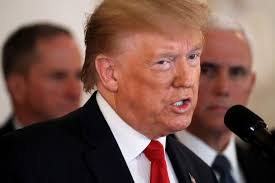President Donald Trump’s initial response to Iran’s ballistic missile strikes targeted at American troops was to tweet a reminder the US has “the most powerful and well equipped military anywhere in the world, by far”.
The attacks – which were in response to the US state-sanctioned killing of a top Iranian military leader – followed days of threats and promises that the US would react “disproportionately” to any retaliation.
The President even identified 52 Iranian sites to be targeted.
After sleeping on his official response, Mr Trump has now moved to de-escalate the growing crisis between the US and Iran.
But while he won’t mobilise military forces – yet – the President has promised a “powerful” and “punishing” response to what was the most brazen direct assault on Americans since the 1979 seizing of the US Embassy in Tehran.
The US is immediately putting in place new economic sanctions “until Iran changes its behaviour”, Mr Trump said from the White House. He called on other world powers to abandon the “defective” nuclear deal made in 2015.
“Iran must abandon its nuclear ambitions and end its support for terrorism. The time has come for the United Kingdom, Germany, France, Russia and China to recognise this reality,” the President added.
“They must now break away from the remnants of the Iran deal – or JCPOA – and we must all work together towards making a deal with Iran that makes the world a safer and more peaceful place.”
Just hours before Mr Trump’s remarks, UK Prime Minister Boris Johnson said the deal remains the “best way of preventing nuclear proliferation in Iran”.
Australian security leaders will meet in Canberra on Thursday to discuss the government’s response to the Iran-US crisis. Prime Minister Scott Morrison has not ruled out pulling Australian troops and diplomats out of Iraq.
Contingency planning for Australian personnel in Iraq has been underway since Saturday when the US confirmed it had killed top Iranian General Qassem Soleimani.
Mr Morrison was briefed on the missile attacks on Wednesday and told Defence chief Angus Campbell to do whatever it takes to keep Australians safe.
In a response that struck a noticeably calm tone compared to his furious Twitter threats after General Soleimani’s death, Mr Trump said: “The fact that we have this great military and equipment, however, does not mean we have to use it”.
“We do not want to use it. American strength, both military and economic, is the best deterrent.”
He said it appeared Iran was “standing down” and the US should be “grateful” there were no casualties in the attacks on the bases in Iraq.
“No Americans were harmed in last night’s attack by the Iranian regime. We suffered no casualties. All of our soldiers are safe and only minimal damage was sustained at our military bases,” he said Thursday morning (Australian time).
“Our great American forces are prepared for anything. Iran appears to be standing down, which is a good thing for all parties concerned and a very good thing for the world.”
Earlier on Wednesday, Iran’s Supreme Leader Ali Hosseini Khamenei described Iran’s attack on troops in the region as a “slap on the face”.
Flanked by Vice President Mike Pence, Defence Secretary Mark Esper and Secretary of State Mike Pompeo and military officers during his televised response, Mr Trump also said he would ask NATO to become “much more involved in Middle East process.”
He also used his address to speak directly to Iran, saying “we want you to have a future and a great future,” adding the US is ready to “embrace peace and all who seek it”.

